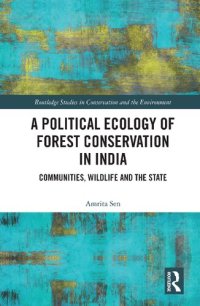
Ebook: A Political Ecology of Forest Conservation in India: Communities, Wildlife and the State
Author: Amrita Sen
- Genre: Other Social Sciences // Philosophy: Critical Thinking
- Series: Routledge Studies in Conservation and the Environment
- Year: 2021
- Publisher: Routledge
- City: London
- Language: English
- pdf
This book critically explores the political ecology of forest conservation and the political making of globally recognized forest landscapes, drawing on examples from India.
The book specifically demonstrates the nuances within human-environmental linkages, by showing how environmental agendas are not only ecological in content, but also political. In India a large part of the forests and their surrounding areas were inhabited far before they were designated as protected areas and inviolate zones, with the local population reliant on forests for their survival and livelihoods. Thus, socio-ecological conflicts between the forest dependents and official state bodies have been widespread, with growing conservation driven dispossessions. This book uses a political ecology lens to explore the complex interplay between current norms of forest conservation and environmental subjectivities. It illustrates contemporary articulation of forest rights and the complex mediations between forest dependents and different state and non-state bodies in designing and implementing regulatory standards for wildlife and forest protection. The book foregrounds issues of identity, migration and power while discussing the politics of conservation and shows how the contemporary making of conservation impacts different forest community groups. Through a political ecology approach, the book is not only human-centric but makes significant use of the role of non-humans in foregrounding the conservation discourse, with a particular focus on tigers.
This book will be of great interest to students and academics studying forest conservation, human-wildlife interactions, environmental sociology and political ecology.